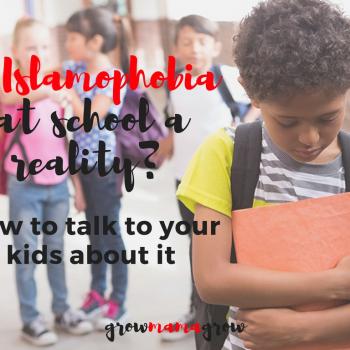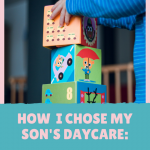There is a fascinating thread on the GrowMama discussion board about the benefits of public schools versus alternative schooling. This piece was written before that discussion was underway and is not a response. We hope readers will share their thoughts on this topic in both the comment section of the blog and on the discussion board!
 My husband and I are committed to sending our daughter to public school. On a very rudimentary level, we took this for granted since we both went to public schools. But, really, our decision is the natural consequence of a few principles we hold dear:
My husband and I are committed to sending our daughter to public school. On a very rudimentary level, we took this for granted since we both went to public schools. But, really, our decision is the natural consequence of a few principles we hold dear:
1. We are American. We do not feel about any other country as we do about America – our birthplace and homeland. American history, the good and bad, is as much our history as is Islamic history, with its good and bad. We assert very strongly that we are American, and that an American identity can encompass many different “races,” “ethnicities,” and ideologies.
2. We were created to participate. My husband and I are involved with the Islamic movement in America, and we strive to live our lives according to the Qur’anic ayah:
Let there arise from amongst you a group of people who call to the good, advocate for what is right and forbid what is wrong. They are the successful ones. (3:104)
For us, this means translating the message of Islam into something that is of benefit to our society. We strive to convey the message of Islam through interpersonal relationships, interfaith work, general “neighborliness,” and hopefully through example. But we are also deeply committed to civic participation. Islam needs to have a voice at the table when America struggles with its institutions and social problems. It is our responsibility to offer the solutions contained within Islam. And, rather more to the point, what is the use of living here – living anywhere – unless we are contributing to some positive change?
3. We are never ONLY parents. When we parent our daughter, we parent as comprehensive humans and Muslims. We don’t separate out our duty to God, society, our child, our parents, ousrelves, etc. We don’t think about Khadijah’s education in a vacuum – that the only thing school is about is, well, education. It is also about social development, communal responsibilities, interpersonal relationships, compromises, challenges… it’s about growing up to be a well-equipped adult.
What does all this mean for school choices? When we think about Khadijah’s school choice, we think about the choice in the context of what we feel is our responsibility as Americans and Muslims, as well as parents. The public school system is an American institution, one that serves the vast majority of American children. If we care about the future of these children (and our country), we must be involved in the system and contribute to its positive development. We must engage.
We also think it is important for our daughter to be exposed, early on, to the types of situations that she’ll be dealing with her whole life (assuming that she – like us – will be engaged in civic matters and have a diverse group of friends of all faiths). School is also a nice way to do it because the challenges and their seriousness tend to mature gradually as she matures. In Kingergarten it is, “Why don’t we celebrate Christmas?” In middle school it is, “Why don’t I go to school dances.” In high school, it is, “Why are those two boys in a romantic relationship?”
We also have the hope (no pressure!) that she can be source of learning about Islam for her peers and teachers. It is a responsibility every Muslim has, and a proud, engaged, sensitive person can more effectively convey Islam to someone than any number of books, websites, or news shows.
Don’t get me wrong – we do have natural concerns. But our strategy has been, and inshaAllah will be, communication and participation. Regular communication with our daughter will help us understand what is going on in school and what challenges she is facing. It will help our daughter understand that her parents are always on her side – no matter what. Participation in her school will help us understand the environment she is learning in, and will help her school understand her and her family better. I think this also helps prevent the school-home dual personality issue.
There are pros and cons to every schooling choice, but we are committed to public school for our daughter’s sake, and for the sake of the adult she will become and the responsibilities she has been given by Allah (swt).
Bhawana Kamil
Bhawana Kamil lives in Santa Clara, CA with her husband and daughter. She teaches Ethics at San Jose State University, and is the president of the Bay Area chapter of the Muslim American Society – but only on the side. Her real job is watching (and hopefully helping) her little girl grow up!











